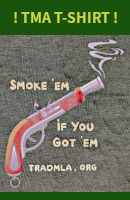This is from another thread, but I felt it deserved a bit more discussion, on it's own.I think in today's world we have a tendency to think the old timers of yesteryear didn't experience the dreaded "flinch" when going from cap to flint
Well Joe, back 150 years ago I expect most folks had one gun, period. We live in an incredibly affluent society where we can afford to have more than firearm and get these problems of switching from one to another. Back in the day you made do with what you had and, while a small minority might have been wealthy enough to have several guns, the vast majority didn't have to decide whether to use the flintlock or the caplock today!
~Kees~
Kees....You brought something to light that has been in my mind for decades....
The vast majority of this young country would have had one gun, at least, and sometimes at best
Chances are it was a hand-me-down, and old to begin with, which would mean it was a flintlock and very likely a smoothbore.
And, I do believe, very strongly, that the "flinch" was there until overcome through the use of that gun.
By the time the Percussion Cap had been invented, got out into circulation, and become popular, those older flintlocks were just getting older, and very likely in need of repair or replacement.
However, re-boring and converting over to Caplock would have been expensive, likely causing the owner to think about replacing, vs redoing his old gun as the cost of replacement was certainly cause for concern....money was in short supply, period.
And all that, in turn, begs the question of marksmanship.
Is it even possible, for the average Muzzleloader.... from back in the day, to become as efficient with their riflegun as the average Muzzleloader of today.......not in regards to how many Muzzleloaders we may have, but how much we get to shoot them, considering the time we devote, and the cost of shooting, along with comparative cost of guns and components.
Back in the day, the harvesting of food was done with the gun.
Since they had to eat, they also had to shoot, and shoot well, in order to survive.
Of course, we've all read of the many local matches that were a common almost every day occurrence, but how about practice?
Did they only practice at the matches? Or, did they manage to practice occasionally on their own?
Did they practice "as much as we do", throughout the year, or did they just grab up their riflegun and go shoot supper, or just go on to the next match?
This question has bugged me for many years, mostly because I strongly believe that practice, as we know practice, was just not there.
What's your thoughts?
Uncle Russ...




